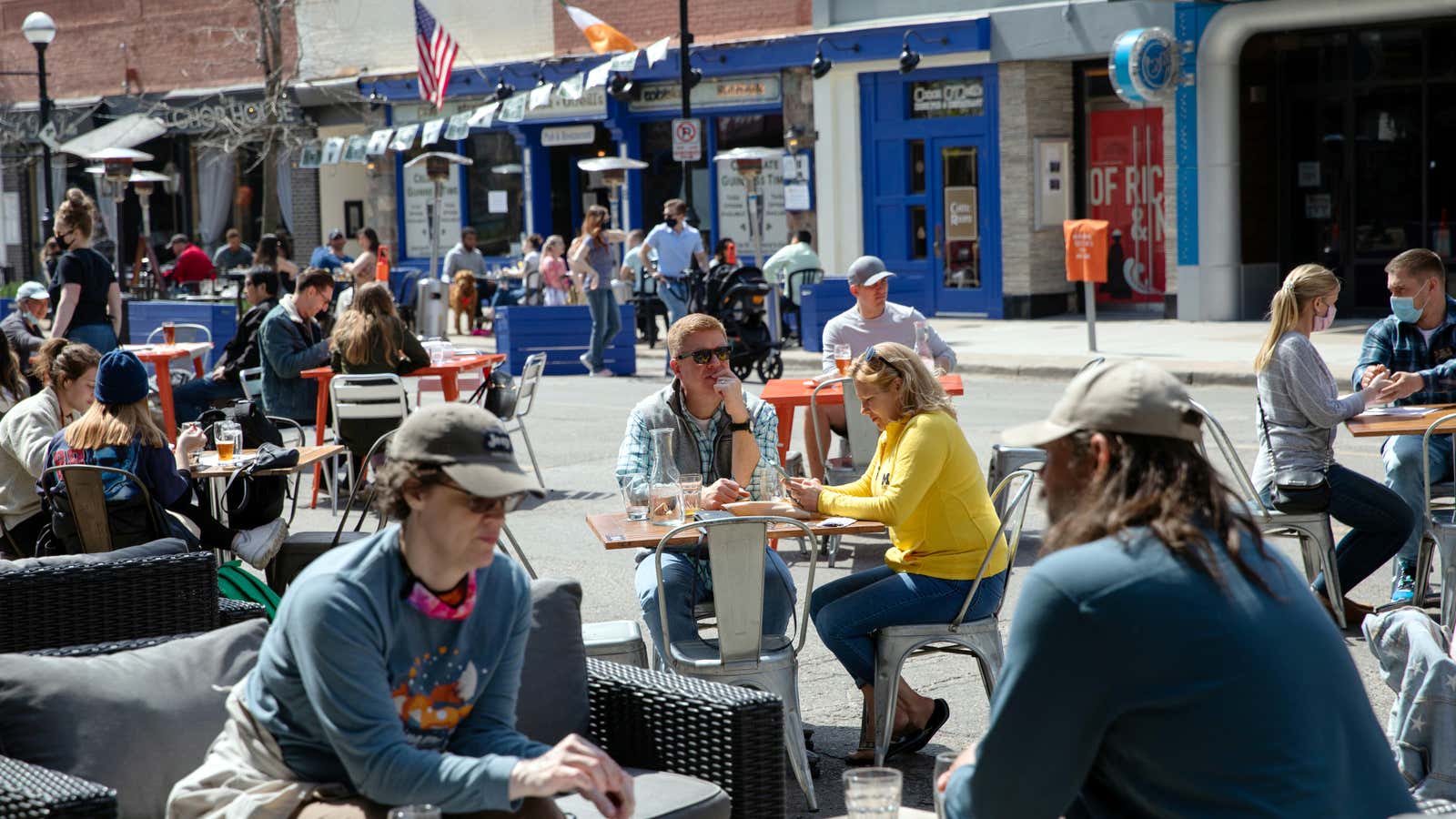There’s one wrinkle when it comes to boosting small business: In general, they aren’t very efficient.
At least on some metrics: Small businesses tend to pay their employees less, provide them less generous benefits, and offer fewer opportunities for advancement compared to larger enterprises. Small businesses aren’t as productive as big businesses—it’s called economy of scale for a reason. Heck, most small businesses don’t even last that long.
Why, then, would we want to encourage more smaller enterprises that don’t pay workers as much or produce things as cheaply as bigger ones?
A common answer is that small business creates the most jobs in the US, but that’s a bit of a statistical anomaly: The reality is that young businesses create the most jobs. Small businesses that stay small—fewer than 100 employees—only make up about a third of US employment.
And yet: People like small business, anecdotally and in survey research. When people are asked about their ideal downtown, they mainly talk about independently-owned local businesses, not national chains. Surveys of downtowns that are consistently rated the best in the US find that they boast a preponderance of independent firms. People find small businesses offer them better service.
The benefit of this size of enterprise, then, is social as much as economic. Dr. Mindy Fullilove, a psychiatrist at the New School in New York City, has spent years investigating the connection between vibrant main streets and public health. She argues that independent businesses play a key role in bringing people together, citing the Washington Heights restaurant Coogan’s—lost during the pandemic—as a place that not only employed locals but also brought them together for philanthropic and community projects.
“[From] my perspective as a physician, that’s actually how you create human health, and it’s how you create cooperative societies, and it’s how you create the social conditions of problem solving,” Fullilove says.

Small business owners aren’t profit maximizers
Research also suggests that small business owners are not quite the entrepreneurs imagined by theorists: people with novel ideas they want to turn into growing businesses. Instead, they are people who want to provide a common service (pdf), while being their own boss and working flexible hours. It makes sense when you think about small firms you encounter—while they may offer unique services, they typically fill a familiar niche in the community.
This reality helps explain why scale-hungry venture capitalists and other investors tend to look past sustainable small businesses when hunting for new places to invest. And it also shows the motivation for locally-owned businesses improve communities where they plan to remain for the long term.
“We think about businesses where owners don’t run the business with the intention of growing it significantly—it earns them a living and provides them with meaningful work and contributes something to the community,” Kennedy Smith, a researcher at the Institute for Local Self Reliance, says. “We’ve moved away, as a nation, as a culture, from respecting and celebrating that kind of business.”
The pandemic, then, might give us an opportunity to change that.

Prioritizing community development
Comparing subsidies and support for small business to those for large businesses can be instructive: While cities and states rush to offer multi-million-dollar subsidies to multinationals considering investments in their states, too often those projects fade away—just look at Wisconsin’s experience with FoxConn. Instead, some economic development experts say that putting that money into a variety of smaller, locally-owned enterprises can do a better job of adding value to the local economy.
“Mayors, governors, policymakers, don’t spend all of your money trying to lure the next Amazon HQ,” says Phillip Gaskin, who works on capital access for small firms at the Kauffman Foundation. “You’ve got great entrepreneurs in your city that you can support.”
And even if the original small business owner doesn’t expect to create a Fortune 100 firm, sometimes there’s just serendipity: Walmart was a family-owned retailer before it became an international colossus.
Small businesses can also add resilience to local economies. As the pandemic has shown, when global supply chains can become brittle and break under stress, local alternatives can sometimes fill in the gap. Investing in light manufacturing businesses is one way to create more resilience. That’s also a development strategy to hire workers, fill up emptying retail buildings, and create vibrant downtowns.
“Why would people stop in your town?” asks Ilana Preuss, an economic development consultant who advocates for small manufacturing businesses. “The things that are unique create that economic longevity, because you can’t just be replaced by the next place.”
Small business, then, is not necessarily the engine of economic growth it is sometimes touted to be. It might be something different, even better: The foundation of stable local economies.
This story has been corrected to report that Dr. Mindy Fullilove is a professor at the New School, and that Coogan’s Restaurant is in Washington Heights.
